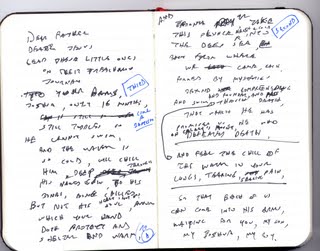Lynne and I are off to Bulgaria to see the premiere of Certitude and Joy and to place wreathes of remembrance on the tombs of the Thracian kings and to investigate the painting techniques of their National Awakening. Queer is just about wrapped up, adjudicated most positively by the expectantly swollen audiences of the last weekend. It was lovely as always to see old friends come out, and lovely to make some new connections as well.
All the performers and crew were fantastic, Joe Wicht lighting up the stage even more brightly this time than last, the person on whose shoulders the piece rests, whose jersey number should be retired along with the show. Ken Berry flew in from Australia to reprise his roles, even more endearing and funny this time than last. And those who were new to cast – James Graham and the regally named pair of Diana Consuelo Hopping Rais and Jorge Rodolfo De Hoyos Jr. – were riveting to watch as they threaded their way through the landscape. It was great to work with Bryan Nies from the Oakland East-Bay Symphony and all the other musicians – Jab and Marja Mutru and Michele Walther and David Sullivan – all the musicians yours truly, who seemed to think that he could play the guitar again after a 10 year hiatus, even though he used the same guitar and strings, lovingly preserved by Thom Blum in a special place, under glass in the crypt below the laundry room leading out to Franklin Street. And who can forget Jim Cave, my main man, who has helped make all of the operas he has touched into something real, making them into the thing that I remember them to be after the greasepaint has dried and the last playbill is swept up? Clyde Sheets once again has made some art, as he has done so often, and Laura Hazlett arrived at a costume design that I myself wish I could be transported into, flicking the ash from my Gitanes to the dusty street. Cid Pearlman, who fixed so many small motions, focusing in, adding beauty. I am the producer of this work, and not just the composer, the one who picks up the music stands and rolls the piano out of the way each night, and, as such, I can't tell you how important it is to have a crew on whom to rely: Catherine Reser the stage manager and gun handler, who, after a misfire one night, took it upon herself to check the load of each blank, to inspect the crimping, to check the smell of the black powder for its correct bouquet, and Will McCandless and Dylan McMillen. And thanks to Greg Kuhn, who didn't sleep for weeks before, during and after.
The work is OK. I've decided this now after seeing and hearing and playing it again. I originally thought that it was a quick bit of flummery knocked off while waiting for the funding to come through for Sub Pontio Pilato, but in playing it again, I hear things I didn't hear before, and once again I am shown that the quickly-written piece allows the channeling of the music-god-all-one-faith-spirit to guide one's hand, while the labored work suffers from too much from mere human frailties.







